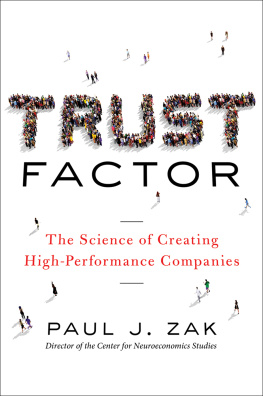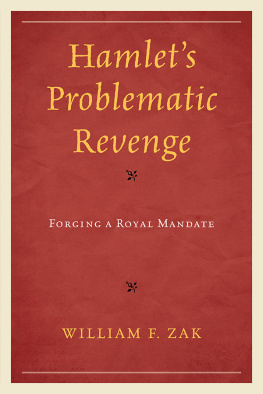
Thank you for downloading this AMACOM eBook.
Sign up for our newsletter, AMACOM BookAlert, and receive special offers, access to free samples, and info on the latest new releases from AMACOM, the book publishing division of American Management Association.
To sign up, visit our website: www.amacombooks.org

Praise for
TRUST FACTOR
Combining his interest in human socialization with his biomedical research, Dr. Paul Zak and his team have examined a connection between how were rewarded with positive feelings and emotions when we do things with people we trust. Lacing this together with Peter Druckers timeless leadership wisdom presents an interesting opportunity for all of us to become better people, better partners, better leaders, and more effective contributors to society.
Curt Pullen, Chairman of the Advisory Board, The Drucker Institute, and former Executive Vice President and President of North America, Herman Miller
Trust is at the core of loyalty, advocacy and satisfactionwith employees, customers and other stakeholder groups. Understanding the principles Paul reveals and how to operationalize them will change the way we think about how we create, motivate and sustain high-performance organizations that deliver business results.
Donna Peebles, former SVP, AIG
With his scientific understanding of oxytocin, Zak provides a set of glasses for looking at how trust motivates people at work, even as he romps through inspiring stories from the cultures of successful organizations.
David Nott, President, Reason Foundation
Although trust is certainly a worthy aspiration, what if it could be more? What if your organization could better understand it, link it to engagement and performance, and build a culture that fostered it? What if your organization could use trust as competitive advantage? Trust Factor provides actionable advicegrounded in neuroscienceon how your organization can use trust to fuel higher levels of engagement and performance.
Walter McFarland, coauthor of Choosing Change and Board Chair Emeritus of the Association for Talent Development
TRUST
FACTOR

The Science of Creating High-Performance Companies
PAUL J. ZAK

American Management Association
New York Atlanta Brussels Chicago Mexico City San Francisco
Shanghai Tokyo Toronto Washington, D.C.
Bulk discounts available. For details visit:
www.amacombooks.org/go/specialsales
Or contact special sales:
Phone: 800-250-5308
Email:
View all the AMACOM titles at: www.amacombooks.org
American Management Association: www.amanet.org
This publication is designed to provide accurate and authoritative information in regard to the subject matter covered. It is sold with the understanding that the publisher is not engaged in rendering legal, accounting, or other professional service. If legal advice or other expert assistance is required, the services of a competent professional person should be sought.
LIBRARY OF CONGRESS CATALOGING-IN-PUBLICATION DATA
Names: Zak, Paul J., author.
Title: The trust factor : the science of creating high-performance companies / Paul J. Zak.
Description: New York, NY : AMACOM, [2017]
Identifiers: LCCN 2016036854 (print) | LCCN 2016046864 (ebook) | ISBN 9780814437667 (hardcover) | ISBN 9780814437674 (ebook)
Subjects: LCSH: Corporate culture. | Trust. | Performance. | Organizational effectiveness. | Organizational behavior. Classification: LCC HD58.7 .Z347
2017 (print) | LCC HD58.7 (ebook) | DDC658.3/12dc23
LC record available at https://lccn.loc.gov/2016036854
2017 Paul J. Zak
All rights reserved.
Printed in the United States of America.
This publication may not be reproduced, stored in a retrieval system, or transmitted in whole or in part, in any form or by any means, electronic, mechanical, photocopying, recording, or otherwise, without the prior written permission of AMACOM, a division of American Management Association, 1601 Broadway, New York, NY 10019.
The scanning, uploading, or distribution of this book via the Internet or any other means without the express permission of the publisher is illegal and punishable by law. Please purchase only authorized electronic editions of this work and do not participate in or encourage piracy of copyrighted materials, electronically or otherwise. Your support of the authors rights is appreciated.
10 9 8 7 6 5 4 3 2 1
To Mary Beth McEuen, who first convinced me that trust is vital in organizations. Thank you for your trust and friendship.

Contents

Introduction
Arriving in Malke, a remote village of 1,000 people in Papua New Guinea, I had only three days to run the first-ever organizational culture experiment in a rain forest, so I had to get my equipment working. While experiments I ran in my laboratory and in companies in the United States had shown that a culture of trust generates high performance, testing members of an isolated tribe would help me determine if trust improves performance everywhere. Adding to the pressure of doing neuroscience in the rain forest, NHK TV from Japan would be filming the experiment.
Naturally, the experiment gods had other ideas.
Malke has no electricity or running water, so I brought all the supplies I would need: a suitcase full of sterile needles, blood-collection tubes, latex gloves, and a small centrifugeitems that shocked New Guinean customs agents despite my government permit. Waiting for me in the capital, Port Moresby, was a rented generator to run the centrifuge and liquid nitrogen flown in from Japan that I needed to freeze blood samples so I could get them back to my California lab.
A small plane took me to the Western Highlands; then a four-wheel-drive transported me over barely passable mud tracks to Malke. I unloaded my gear, built a serviceable medical hut, and started testing the equipment. The centrifuge made a burning smell that I traced to a buggy voltage regulator, and the liquid nitrogen that I was promised would last a week had evaporated. This deep in the jungle, the markets I could reach sold basic foods and recycled everything else.
My lifeline was Digicel. This Irish-owned, Jamaica-based, low-cost mobile-phone provider allowed me to call liquid nitrogen suppliers from Australia to Japan from 7,000 feet above sea level. So I sat on the grass and started making calls, hoping I could cajole some supplier to make a long-distance delivery. I was agitated and defeated.
Then the villagers began to sit down beside me. After 20 minutes, 30 or 40 people had crowded around, and I put away my phone. The children started holding my hands and smiling. I made faces at them, and we all laughed. The village chief, Edward, came over and put his hands on my shoulders and said, Hi-oh, the New Guinean pidgin greeting. I said, Hi-oh back. Within an hour, I was being treated like a member of the village. The Malkeans welcomed me into their thatched-roof houses and into the outbuildings where the men practiced the rituals of their ancestors. As I relaxed into their hospitality, my problems slipped away.
Next page















